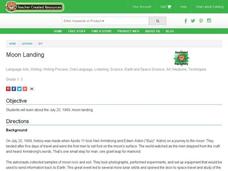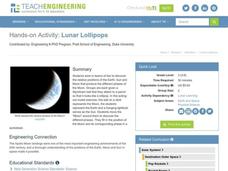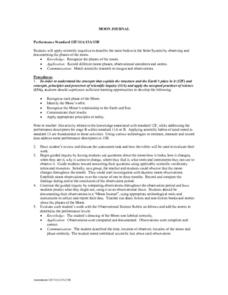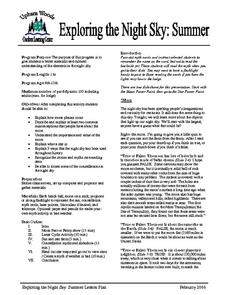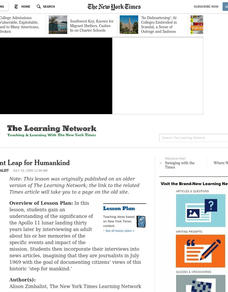Curated OER
Apollo Moon Landing
Students explore paper rockets, learn about the Apollo Program and Apollo spin-offs, and use simple office supplies to design and create a new useful product. This amazing plan is incredibly well written and leads students through a...
Curated OER
Moon Landing
Young scholars research about the July 20, 1969, moon landing. They demonstrate their knowledge of the first moon landing by creating peek-a-boo rocket books. Also they can make their own moon rocks with an easy-to-make dough.
Curated OER
The Moon's Phases
In this science worksheet, students visit a specified Web site which allows them to discover the phase of the moon on any date in history. Students record the moon phase for the day of their birth, the first moon landing in 1969 and on...
Curated OER
Life on the Moon
Pupils study the physical properties of the Moon. In this life on the moon lesson students describe the ways life on the Moon would be different than on Earth.
Curated OER
Activity on United States Moon Landing: Apollo 11
Students use the World Wide Web to access additional information needed to complete a set of questions. They demonstrate an understanding of latitude and longitude by interpreting a lunar map.
Curated OER
Astronomy and Me: Moons Over New Haven
Third graders study the features of different moons orbiting the planets. In this astronomy lesson, 3rd graders explore the different phases of the moon using an interactive online website. They compare and contrast the features of the...
Curated OER
Mars Landing Site
Learners, through the use of candy bars at room temperature, explore the problems selecting a landing site on Mars.
Curated OER
Flight of the Future/Space Flight
Students explore space science by viewing videos on YouTube. In this moon landing lesson, students view clips of Neil Armstrong taking his first step on the moon and discuss the space race between the U.S. and Russia. Students utilize...
University of Colorado
Happy Landings: A Splash or a Splat?
Huygens spacecraft landed on Saturn's moon Titan in 2005, making it the farthest landing from Earth ever made by a spacecraft. For this hands-on activity, the 12th installment of 22, groups explore how density affects speed. To do this,...
NASA
The Lunar Lander – Ascending from the Moon
What angle? Groups determine the height of the lunar lander as it ascends from the surface of the moon and calculate the angle of elevation of the lunar lander at specific times and distances. The provided series of questions lead the...
Curated OER
Team Moon
Learners read "Team Moon: How 400,000 People Landed Apollo 11 on the Moon," by Catherine Thimmesh. They watch portions of the movie "Apollo 13." Students use the internet and the attached study guide to discover specific information...
Curated OER
Lunar Learning
Students learn about the phases of the moon. In this moon phases instructional activity, students learn about what causes the moon to look different to us everyday and how the Earth and Sun's position determine what phase the moon is in.
University of Colorado
Distance = Rate x Time
Every year, the moon moves 3.8 cm farther from Earth. In the 11th part of 22, classes use the distance formula. They determine the distance to the moon based upon given data and then graph Galileo spacecraft data to determine its movement.
Curated OER
Working on the Moon
Students take a mission to the moon. In this space science lesson, students visit selected websites to discover information about Earth's moon and the solar system. Students may take virtual missions to the moon and share information...
Curated OER
Space Exploration
Sixth graders investigate the historical even surrounding the Apollo Mission to the Moon. They conduct research specifically to find information about the astronauts on the mission. The students conduct class discussion about the...
Curated OER
Lunar Lollipops
Students work with a partner, Styrofoam ball and light source to simulate the positions of the Earth, Moon and Sun at various stages during the phases of the Moon. They describe why the Moon is visible from Earth and complete a worksheet.
Curated OER
Observing and Sketching the Lunar Surface
Students explore space science by conducting an illustration activity. In this lunar lesson, students discuss what the moon is and the role it plays for our environment on Earth. Students view images of the moon and utilize chalk to...
Curated OER
Settlement Exploration: Then and Now
NASA has crafted an imaginative and memorable series of lessons, "NASA and Jamestown Education Module." This lesson is one of the five components. In it, middle schoolers connect history and science by comparing the settlement of...
Curated OER
Moon Journal
Fourth graders observe Moon and its features, and record results both in written form and in a drawing on the given template.
Curated OER
Exploring the Night Sky: Summer
Students explain how moon phases occur. They describe and explain at least two common misconceptions that people have about the moon. Students explain what a star is. They explain 3 ways that the night sky has been used throughout history.
Curated OER
"One Giant Leap for Mankind"
Learners explore the significance of the Apollo 11 lunar landing by interviewing an adult for memories of the mission. They incorporate their interviews into news articles as 'journalists' in July 1969 to document this historic 'step for...
Space Awareness
Meet Our Home: Earth
Earth is a complex structure. Learners explore their home, the earth, using a fun hands-on activity. They create tactile models of the earth using ordinary household materials that represent some common features: land, polar caps,...
Curated OER
Fact or Hoax? You Decide.
Students analyze the components of debating and practice what they have learned as they conduct a class debate on the lunar landing. Both sides of the issue are researched and presented to the group.
NASA
Earth, Can You Hear Me Now?
How long did you say? Class groups plot the distances between Earth and Mars and determine the trigonometric function that models the data. Using a calculator, they graph the function to determine when the distance and communication...
Other popular searches
- Moon Landing Worksheets
- 1969 Moon Landing
- First Moon Landing
- Moon Landing Math
- Moon Landing Science
- The Moon Landing
- Facts About Moon Landing
- Moon Landing Hoax
- Moon Landing Lab
- Moon Landing History
- Nasa Materials Moon Landing
- Faked Moon Landing



